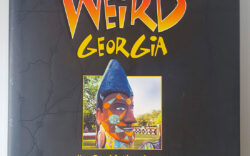It was the biggest story I’ve ever covered, and it happened just an hour’s drive and 93 million miles away.
Five years ago, on Aug. 21, 2017, a total eclipse of the sun brought beauty and wonder to this divided nation. What was called “the great American eclipse” was viewed by millions of people along a line stretching diagonally across the United States from the Pacific Northwest to the coastal Southeast.
In my time as a writer, I have been fortunate to be an eyewitness to such historic events as the 1976 U.S. Bicentennial celebration in the nation’s capital, the first space shuttle launch, political conventions, presidential inaugurations and protest marches in New York, Washington, Chicago, Philadelphia and other locales. All those heady experiences, historic stories and indelible memories were–to use an appropriate word–eclipsed on a late summer day five years ago when the sun and the moon did their heavenly rendezvous in the spacious skies of America.
Here in Athens, the 2017 eclipse was not total, but a large crowd viewed the spectacle from Sanford Stadium. They enjoyed a good sky show, but to really see a total solar eclipse, you had to be there. My wife Joy and I went to the charming Georgia mountain town of Toccoa to experience the two minutes of darkened sun there. Thousands gathered near the Amtrak depot in Toccoa, and the town’s hopeful slogan—”Totality at Toccoa”—came true as the moon covered the sun for just a few fleeting moments that will be remembered for all the lives of all the people who were there to see nature’s stately, stellar cosmic choreography. The “great American eclipse” lived up to its advance billing.
In 1984 there was a near-total annular eclipse visible in Athens. I reported on that celestial event for the September 1984 issue of Astronomy magazine in an article titled “Sunshow in the Southland.” A third of a century later, in 2017, I was on the scene in the path of totality to report on that year’s solar eclipse in an astronomy.com article called “A Tale of Two Eclipses,” in which I compared the 1984 annular eclipse with the aptly named “great American eclipse” five years ago. Both eclipses were spectacular, but the “Totality in Toccoa” was an unforgettable experience that was simultaneously humbling and exalting. In my astronomy.com article, I wrote that the eclipse was “a magical, mystical and majestic experience that was both scientific and spiritual.”
People who missed the total solar eclipse of 2017 will have an opportunity to see the next eclipse of the sun visible in the United States on Apr. 8, 2024. That cosmic event will be visible in a path running from Texas to Maine, including such cities as Austin, Dallas, Little Rock, Indianapolis and Buffalo. No total eclipse of the sun will be visible from Georgia until Aug. 12, 2045, when the path of totality cuts across a thin slice of southwest Georgia. Folks wanting to see a total eclipse of the sun from right here in Athens will have to wait until May 11, 2078, when the moon will cover the sun for 5 minutes and 16 seconds. In that faraway springtime nearly 56 years hence, crowds of future eclipse chasers may again pack the stadium on the university campus to view a sky show instead of a football game.
Future local historians may marvel at the Aug. 16, 2017 issue of Flagpole, which previewed the eclipse and featured a breathtaking cover image of a darkened sun surrounded by orange solar fire. People who are alive for the 2078 eclipse may also read my Sept. 5, 2017 Athens Banner-Herald column about the eclipse, in which I wrote, “In this age of trumpery, cynicism and scientific illiteracy, the eclipse was a unifying moment for an often divided nation.”
Natural spectacles like the 2017 “great American eclipse” transcend our political divisions. Five years ago, Americans of the 21st century glimpsed the truth of what Victor Hugo wrote in the 19th century: “Nations, like stars, are entitled to eclipse. All is well, provided the light returns and the eclipse does not become endless night.”
Like what you just read? Support Flagpole by making a donation today. Every dollar you give helps fund our ongoing mission to provide Athens with quality, independent journalism.










